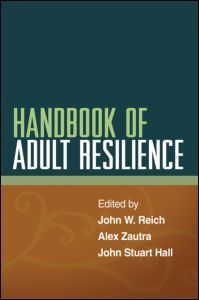Description
Handbook of Adult Resilience
Coordinators: Reich John W., Zautra Alex J., Hall John Stuart
Language: English
Subject for Handbook of Adult Resilience:
Publication date: 05-2012
· 17.8x25.4 cm · Paperback
Publication date: 02-2010
· 17.8x25.4 cm · Hardback
Description
/li>Contents
/li>Readership
/li>Biography
/li>Comment
/li>
What enables people to bounce back from stressful experiences? How do certain individuals maintain a sense of purpose and direction over the long term, even in the face of adversity? This is the first book to move beyond childhood and adolescence to explore resilience across the lifespan. Coverage ranges from genetic and physiological factors through personal, family, organizational, and community processes. Contributors examine how resilience contributes to health and well-being across the adult life cycle; why--and what happens when--resilience processes fail; ethnic and cultural dimensions of resilience; and ways to enhance adult resilience, including reviews of exemplary programs.
I. Resilience at Many Levels of Analysis 1. Resilience: A New Definition of Health for People and Communities, Alex J. Zautra, John Stuart Hall, and Kate E. MurrayII. Basic Dimensions of Resilience A. Biological Dimensions of Resilience 2. Psychobiological Mechanisms of Resilience to Stress, Adriana Feder, Eric J. Nestler, Maren Westphal, and Dennis S. Charney 3. Genes and Environments: How They Work Together to Promote Resilience, Kathryn Lemery-ChalfantB. Cognitive, Affective, and Behavioral Models of Resilience 4. Positive Emotions as a Basic Building Block of Resilience in Adulthood, Anthony D. Ong, C. S. Bergeman, and Sy-Miin Chow 5. Personal Intelligence and Resilience: Recovery in the Shadow of Broken Connections, John D. Mayer and Michael A. Faber 6. The Resilient Personality, Andrew E. Skodol 7. Resilience in Response to Loss, Kathrin Boerner and Daniela Jopp 8. Psychopathology as Dysfunctional Self-Regulation: When Resilience Resources Are Compromised, Paul Karoly 9. Self-Complexity: A Source of Resilience?, Eshkol Rafaeli and Atara Hiller 10. Anchored by Faith: Religion as a Resilience Factor, Kenneth I. Pargament and Jeremy CummingsC. Resilience across the Lifespan 11. Resilience over the Lifespan: Developmental Perspectives on Resistance, Recovery, and Transformation, Ann S. Masten and Margaret O’Dougherty Wright 12. Early Adversity and Resilience in Emerging Adulthood, Linda J. Luecken and Jenna L. Gress 13. Resilience to Potential Trauma: Toward a Lifespan Approach, Anthony D. Mancini and George A. BonannoD. Social Dimensions of Resilience 14. Resilience in Adolescence: Overcoming Neighborhood Disadvantage, Marc A. Zimmerman and Allison B. Brenner 15. Social Support and Growth Following Adversity, Vicki S. Helgeson and Lindsey LopezE. Organizational and Public Policy Dimensions of Resilience
16. Building Organizational Resilience and Adaptive Management, Janet Denhardt and Robert Denhardt
17. Indicators of Community Resilience: What Are They, Why Bother?, John Stuart Hall and Alex J. ZautraIII. Ethnic and Cultural Dimensions of Resilience 18. Cultural Adaptation and Resilience: Controversies, Issues, and Emerging Models, Felipe González Castro and Kate E. Murray 19. Cultural Dimensions of Resilience among Adults, Michael UngarIV. Interventions for Enhancing Resilience 20. The Emergence of Capacity-Building Programs and Models of Resilience, Martha Kent and Mary C. Davis 21. Boosting Happiness, Buttressing Resilience: Results from Cognitive and Behavioral Interventions, Sonja Lyubomirsky and Matthew D. Della Porta 22. Positive Affect at the Onset of Chronic Illness: Planting the Seeds of Resilience, Judith Tedlie Moskowitz 23. Asset-Based Strategies for Building Resilient Communities, John P. Kretzmann 24. Health in a New Key: Fostering Resilience through Philanthropy, Roger A. Hughes
John W. Reich, PhD, is Emeritus Professor of Psychology at Arizona State University (ASU). His work has focused on the application of social psychological concepts in understanding societal issues and the development of interventions for improving individuals’ well-being. Dr. Reich and the other two coeditors are members of the ASU Resilience Solutions Group, which was the source of the development of this handbook.
Alex J. Zautra, PhD, is Foundation Professor of Clinical Psychology at ASU. His research, clinical work, teaching, and publications explore fundamental mind-body issues such as the role of positive emotion in health and the sources of resilience within the person that restore health and well-being following challenges from stressors at home, at work, and in community life. Dr. Zautra's current research focuses on resilience to chronic pain and resilience as people age.
John Stuart Hall, PhD, is Professor of Public Affairs and Public Service at ASU. A founder and former Director of ASU’s School of Public Affairs and its Center for Urban Studies, and Project Director of over 40 large-scale funded and often interdisciplinary urban research projects, Dr. Hall has specialized in linking the University with pressing community public policy and governance issues. His current research interests include building resilience in communities and urban regions, and healthy aging.
These books may interest you

Handbook of Resilience in Children 316.49 €



